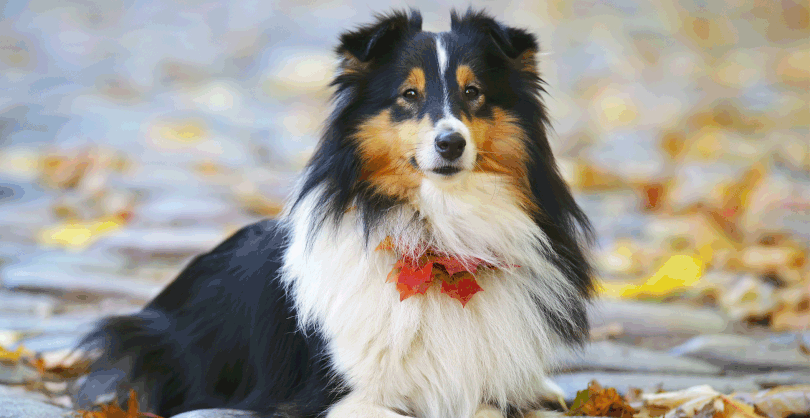Dog Breed
Shetland Sheepdog
BraniacFarmhand

- Full Name
- Shetland Sheepdog
- Alternate Names
- Sheltie
- Your PupScore
- Take the best dog breed quiz to get your Pup Scores!
- Life Span
- 12 - 14 years
- Weight
- 22 - 30 pounds
- Description
If you don't like being alone and want a companion that will be affectionate and even protective, let us introduce you to the Shetland Sheepdog.
Shetland Sheepdogs are very smart, lively and loyal. They are often used as medical alert dogs and as service or therapy dogs. They love to train and learn new tricks as it makes them feel fulfilled, almost as being with their family, especially children with who they can play for hours and hours. Although they are very friendly with their family and people they know, they can be a bit reserved with strangers. They have an incredible combination of intelligence and affection.- Origin
- Scotland
- Bred For
- Sheep herding
- Family Considerations
- Overall Ease of Breed
- Personality
- Home and Environment Considerations
- Physical Characteristics
Child Friendly
4/5
Is the Shetland Sheepdog good with children?
Yes, the Shetland Sheepdog is very friendly with children. We still recommend introductions to children while they are young so they get used to them, but the Shetland Sheepdog naturally loves children.
Stranger Friendly
3/5
Is the Shetland Sheepdog friendly with strangers?
The Shetland Sheepdog is about average in how friendly they are with strangers. They can be timid or protective, but with proper training and socialization can be fine for any household.
Dog Friendly
3/5
Is the Shetland Sheepdog friendly with other dogs?
The Shetland Sheepdog is about average in how friendly they are with other dogs. They can be timid or defensive, but with proper training and socialization can be fine for dog parks and living with other dogs at home.
Likes to Cuddle
4/5
Does the Shetland Sheepdog like to cuddle?
The Shetland Sheepdog appreciates affection and that includes kisses and snuggles!
Playfulness
4/5
Does the Shetland Sheepdog like to play?
The Shetland Sheepdog will almost always be ready for play! The Shetland Sheepdog is great for a family with children, or otherwise, an environment that is always ready for play.
Service Dog Ability
3/5
Does the Shetland Sheepdog make a good service dog?
The Shetland Sheepdog is not typically used as a service dog. There are always exceptions to the rule, but a service dog has to have many natural traits in addition to the proper training- smart, patient, and obsessed with pleasing their owner.
Ease for Novice
4/5
Is the Shetland Sheepdog good for first-time owners?
The Shetland Sheepdog is a good breed for first-time owners. A good fit for first-time owners are friendly breeds that are motivated to please their owner. This means they can be trained, and are rarely aggressive and overpowering.
Training Potential
4/5
How well can the Shetland Sheepdog be trained?
The Shetland Sheepdog can be trained very well. With discipline and a routine training program the Shetland Sheepdog can be incredibly well-trained.
Amount of Shedding
4/5
Does the Shetland Sheepdog shed a lot?
The Shetland Sheepdog sheds a lot! They may still shed less than a few other breeds, but be prepared for dog hair throughout the home and on your clothes.
Ease of Grooming
3/5
Is the Shetland Sheepdog easy to groom?
The Shetland Sheepdog requires an average amount of grooming. Taking your Shetland Sheepdog to the pet salon will make your life easier, but its possible to groom a Shetland Sheepdog on your own as well.
Exercise Need
3/5
Does the Shetland Sheepdog need a lot of exercise?
The Shetland Sheepdog requires an average amount of exercise. You should be ready to dedicate a couple of short walks or a larger dog park session each day for your Shetland Sheepdog to be happy and fulfilled.
Intelligence
5/5
How smart is the Shetland Sheepdog?
The Shetland Sheepdog is one of the smartest dog breeds. Having a very smart dog is fun, but it is also demanding- they require mental challenge and stimulation just as much as physical exercise.
Amount of Barking
5/5
How much does the Shetland Sheepdog bark? Does the Shetland Sheepdog bark too much?
The Shetland Sheepdog barks all the time. They are big talkers, and want to show it! In general, barking and being expressive can be beneficial, such as for guarding property or livestock. But it is important to consider whether heavy barking suites your lifestyle.
Guard Dog Ability
2/5
Is the Shetland Sheepdog a good guard dog?
The Shetland Sheepdog would not make a good guard dog. They can be alert, but typically do not have the desire or instinct to take on "guarding" as their job.
Tolerates Being Alone
2/5
Is the Shetland Sheepdog good at staying alone? Is the Shetland Sheepdog independent?
The Shetland Sheepdog is not very independent and does not do great when left behind for longer than a couple of hours. This is one of the most important things to consider when getting a new dog.
Good for Apartment Living
3/5
Is the Shetland Sheepdog a good apartment dog?
The Shetland Sheepdog is not the best dog apartment living, but it can work if the owner is dedicated to exercising and training their Shetland Sheepdog
Size
2/5
How big is the Shetland Sheepdog?
The Shetland Sheepdog is below average when it comes to size. They are not a "toy" breed, but it is still significantly easier to travel with them.
Tolerates Heat
3/5
How much does the Shetland Sheepdog tolerate hot weather? When is it too hot for a Shetland Sheepdog?
The Shetland Sheepdog can tolerate some heat, but should not be over-exposed to hot weather. In general, they can live in hot weather climates, but would do best with air conditioning or at least a fan in their home, especially where they sleep.
Tolerates Cold
4/5
How much does the Shetland Sheepdog tolerate cold weather? When is it too cold for a Shetland Sheepdog?
The Shetland Sheepdog can tolerate cold weather well. Play time in the snow or on particularly cold evenings may need to be limited, but overall they can do well in cold climates.
Potential to Run Away
3/5
Does the Shetland Sheepdog try to run away?
The Shetland Sheepdog does sometimes run away. This is especially true if they are distracted, or see other cats or dogs. They probably won't go out of their way to "escape", but a fenced yard is still recommended.
General Health
4/5
Is the Shetland Sheepdog a healthy dog? The health of a Shetland Sheepdog should be measured not just by how many years they live, but also by how many health issues they've had. It is important to know which health conditions your breed is prone to- hip problems, eye problems, bloating, and arthritis are all common dog health problems.
The Shetland Sheepdog is very healthy, but it is still important to feed the Shetland Sheepdog high-quality food and to live a healthy lifestyle.
Energy Level
4/5
How energetic is the Shetland Sheepdog?
The Shetland Sheepdog has a lot of energy and this needs to be considered before bringing the Shetland Sheepdog into your home. Can you give your Shetland Sheepdog enough exercise? They will need several small daily walks, or a large dog park trip to get all of the energy out.
Amount of Drooling
1/5
How much does the Shetland Sheepdog drool?
The Shetland Sheepdog does not drool at all.
Prey Drive
4/5
Does the Shetland Sheepdog have a large prey drive? Does the Shetland Sheepdog like to chase birds, cats, and other small animals?
The Shetland Sheepdog has a high prey drive and has a natural tendency to chase after any small animal. Every case is unique, but the Shetland Sheepdog may not be the best dog for living with other cats or small animals.
Athleticism
4/5
Is the Shetland Sheepdog atheltic?
The Shetland Sheepdog is very athletic and would be well suited for a family that frequently works out or goes on adventures.
Breed Variations
Sable
Tricolor
Merle
Black and White
 Dog
Dog- Herding
- Shepherd / Sheepdog
- Shetland Sheepdog
The Shetland Sheepdog is a purebred dog that belongs to the Shepherd / Sheepdog sub group, which falls under the larger Herding dog breed group.
Herding group: The Herding group dogs all share an instinctual ability to control the movement of other animals. They have traditionally been raised on farms to help herd and protect valuable livestock.
They are intelligent, and have been bred to treat each day like they have a "job" they must do. Their innate herding ability is such a big part of who they are, that they are known to even "herd" their owners, children, or other small dogs. Some can seem stubborn and even obsessed with their herding, since they take it seriously!
They have high expectations, and must be stimulated mentally just as much as physically. The reward to these "high expectations" is that they can be trained very well, and are oftentimes used in competitions. Certain breeds such as the well known German Shepard are also used by Police forces, because of their discipline, intelligence, and ability to be trained.
Shepherd / Sheepdog sub-group: Shepherd dogs are the super performers of the dog world. For many generations they have served their owners by performing their job of helping in the farm- guarding, protecting, and herding. Shepherds were bred based off intelligence and temperament, and willingness to serve their families. Today they are excellent family dogs, but also excel as military service animals, emotional therapy dogs, and in competitive obedience competitions.
They are highly trainable and intelligent, but that does not necessarily mean they are an easy dog or optimal for first time owners. With this potential comes greater responsibility from the owner. They need a firm owner who is willing to stimulate them both physically and mentally from an early age. They need a leader. If they have one, you will be rewarded with one of the friendliest and most intelligent dogs in the World.
Shetland Sheepdogs for adoption
Similar Breeds



